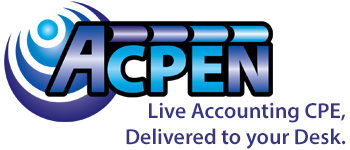No programs are for sale on this catalog.
In order to purchase one of our programs, please visit catalog.acpen.com.
Problematic Self-Directed Retirement Activities Series - Session 4: Problematic Self-Directed Retirement Plan Activities
Total Credits: 3 including 3 Taxes - Technical
- Average Rating:
- 5
- Categories:
- ACPEN Industry Institute | ACPEN Tax Institute | IRS Approved | Tax
- Speaker:
- David Randall Jenkins, Ph.D.
- Course Levels:
- Intermediate
- Duration:
- 3 Hours
- Product Type:
- On Demand
- License:
- Access for 1 year(s) after purchase.
Description
In the first lecture of this four-lecture retirement plan tax law series, Retirement Plan Management and Investment Risk Diversification Standards, we learned the retirement plan (self-dealing activity, incidental benefit) bright line was quantified and defined by public policy’s management and investment risk diversification standards. Such retirement plan risk diversification policy compliance results in transforming generally proscribed Sections 4975(c)(1)(D), (E), or (F) prohibited transaction self-dealing activities into incidental benefits. In the third lecture of this four-lecture retirement plan tax law series, Prohibited Transaction Chinese Walls, we learned eviscerating the self-dealing activity nexus plan asset element by and through properly invoking plan asset rule exceptions enables transforming specifically proscribed Sections 4975(c)(1)(A), (B), or (C) prohibited transaction self-dealing activities into incidental benefits. This lecture applies those retirement plan tax law fundamental concepts in teaching problematic self-directed retirement plan activities. Problematic activities currently pervasive across the nation generally include retirement plan management and investment risk diversification policy noncompliance, the lack of properly using Prohibited Transaction Chinese Walls, and specifically include the use of disqualified person entity Checkbook LLCs, self-directed retirement plan indirect operating company investments, unremunerated account holder non-administrative services, and unreported real estate dealer activity Section 512 unrelated business taxable income.
**Please Note: If you need credit reported to the IRS for this IRS approved program, please download the IRS CE request form on the Course Materials Tab and submit to leighanne.conroy@acpen.com.
Basic Course Information
Learning Objectives*Understanding the history of substantial economic effect policy evolution
*Understanding Going Concern and Liquidation Capital Account Maintenance (Per Capita: Balances: Ratios) method transitivity
*Understanding economic effect trinity’s elements: capital account maintenance, liquidation in accordance with capital account balances, and final capital account deficit restoration
*Understanding Economic Effect Equivalence
*Understanding the simplicity of substantiality’s conclusive presumption
*Understanding necessary partnership agreement special allocation substantial economic effect provisions
*Understanding a substantial economic effect financial forecast should be created at the time originating and offsetting allocations are included in the partnership agreement to show there is a reasonable possibility the allocation will affect substantially the dollar amounts to be received by the partners of the partnership, independent of tax consequences
Major Subjects
*Partnership Special Allocations: History, Background, and Policy
*(Per Capita: Balances: Ratios) Capital Account Accounting Method Transitivity
*Economic Effect Trinity, including Economic Effect Equivalence
*The Simplicity of Substantiality’s Conclusive Presumption
*Simple Partnership Agreement Special Allocation Substantial Economic Effect Provisions
*Spreadsheet Going Concern and Liquidation Special Allocation Substantial Economic Effect Reasonable Possibility Analysis
Course Materials
| Problematic Self-Directed Retirement Activities Series - Session 4_Jenkins Credentials (0.09 MB) | Available after Purchase | ||
| Problematic Self-Directed Retirement Activities Series - Session 4_Handout Articles (0.97 MB) | Available after Purchase | ||
| Problematic Self-Directed Retirement Activities Series - Session 4_Slides (2.65 MB) | Available after Purchase | ||
| Important CPE Credit Instructions_READ BEFORE WEBCAST UPDATED (0.47 MB) | Available after Purchase | ||
| IRS CE Credit Request Form (0.15 MB) | Available after Purchase | ||
Speaker

David Randall Jenkins, Ph.D. Related Seminars and Products
David Randall Jenkins, Ph.D., received his doctorate in accounting and a master’s in accounting with an emphasis in tax from the University of Arizona. He has taught financial, managerial, and tax accounting courses at both the graduate and undergraduate levels. Dr. Jenkins is an AACSB academically qualified business school and tax professor owing to his peer reviewed journal article publications. His company, Algorithm LLC (algorithm-llc.com), is an IRS Approved Continuing Education Provider. Dr. Jenkins may be contacted at tucjenkins@aol.com.
Additional Info
Basic Course Information
Original Recording Date08/03/2015
Date Added to Catalog
07/31/2015
Prerequisites
Participants in this lecture should have some basic understanding of: Partnership capital account accounting, Partnership capital account account methods, and Partnership tax law
Advanced Preparation
Review the Course Materials
Designed For
CPAs, Attorneys, , Enrolled Agents, Other Tax Professionals
Course Developer
David Randall Jenkins, Ph.D.
Yellow Book
No
Additional Information
Instructional Delivery MethodGroup Internet Based
Complaint Resolution Policy
Please contact Anne Taylor for any complaints. anne.taylor@acpen.com, (972-377-8199).
Official Registry Statement
Business Professionals' Network, Inc. is registered with the National Association of State Boards of Accountancy (NASBA) as a sponsor of continuing professional education on the National Registry of CPE Sponsors. State boards of accountancy have final authority on the acceptance of individual courses for CPE credit. Complaints regarding registered sponsors may be submitted to the National Registry of CPE Sponsors through its website: www.nasbaregistry.org
Promo Video
Reviews
| 5 |
|
| 4 |
|
| 3 |
|
| 2 |
|
| 1 |
|


